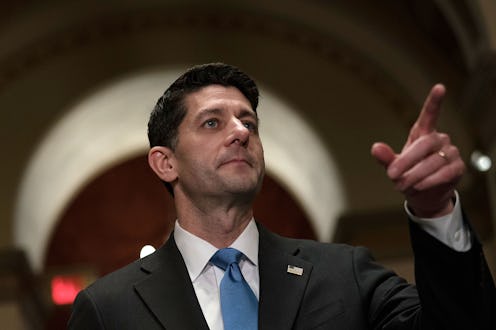
According to Senate aides who spoke with Politico, it looks like Republicans will vote on tax reform on Wednesday — the second time in two days. Although the House already approved the GOP's monumental tax overhaul once on Tuesday in a party-line vote, moving forward with the bill may be a little difficult because some parts of it reportedly violate Senate rules. The latest Capitol Hill development appears to be yet another hiccup for Republicans who'd been celebrating victory on their Tax Cuts and Jobs Act (TCJA) bill.
At least two provisions of the Republican legislation that passed the House Tuesday seem to be in violation of the Senate's Byrd rule, which is a pretty obscure method for testing legislation in the upper chamber. Basically, the Byrd rule works like a magnifying glass that's meant to go over the legal text of a bill and see whether or not a demand is relevant to the budget.
There are two provisions in the GOP bill that reportedly didn't meet that test. According to CBS News, one of the Byrd rule violations was the bill's demand to utilize 529 savings to fund home-schooling across the United States. This bit of the bill was strongly favored by Education Secretary Betsy DeVos. "Expanding 529’s to include any educational option is a common-sense reform that reflects the reality that we must begin to view education as an investment in individual students, not systems," DeVos said.
Another piece of the legislation that reportedly runs up against the Byrd rule is the bill's demand to free colleges that have less than 500 students from paying endowment taxes. Economic experts told Bloomberg that such a move would hurt higher population institutions, including Ivy League universities. According to this provision of the GOP bill, higher income institutions would have to follow a 1.4 percent tax and colleges with over 500 students are already criticizing the bill.
Both provisions seem to clash with the Byrd rule. Under this rule, the Senate parliamentarian will go through the bill's details and confirm if the demands should remain in the legislation. As mentioned before, the provisions need to be relevant and productive for the nation's economy. Does the stated provision boost domestic revenue? Does it help to cut national expenditure? Questions like these are some of the ones factored in by the Senate parliamentarian. If they fail to adequately answer these important points, the provisions are cut out.
Even with the hiccup caused by the Byrd rule, Republicans don't seem to be pessimistic about the bill's passing. A representative from the House Ways and Means' committee spoke with Business Insider to say the House will go forward regardless and vote on Tuesday night. The representative said, "The Senate parliamentarian determined two minor provisions do not have budgetary impacts and had to be removed from the bill. The Senate will still vote tonight, and the House will vote tomorrow to send the final bill to the President’s desk."
Still, even with Republicans' optimism about their tax reform bill, major Democrats have expressed doubt about the bill's stability, and perhaps that says a good deal about the likelihood of the bill going forward. One of the most notable remarks came from Senate Minority Leader Chuck Schumer. Schumer said, "Given the bill’s substance, it’s no surprise they’re in such a rush. 11th hour backroom deals have managed to only make their bad bill even worse. They don’t want to discuss it, they don’t want to have sunlight shed on it, they don’t want anyone to know what’s in it because it is so, so bad and the public knows it."